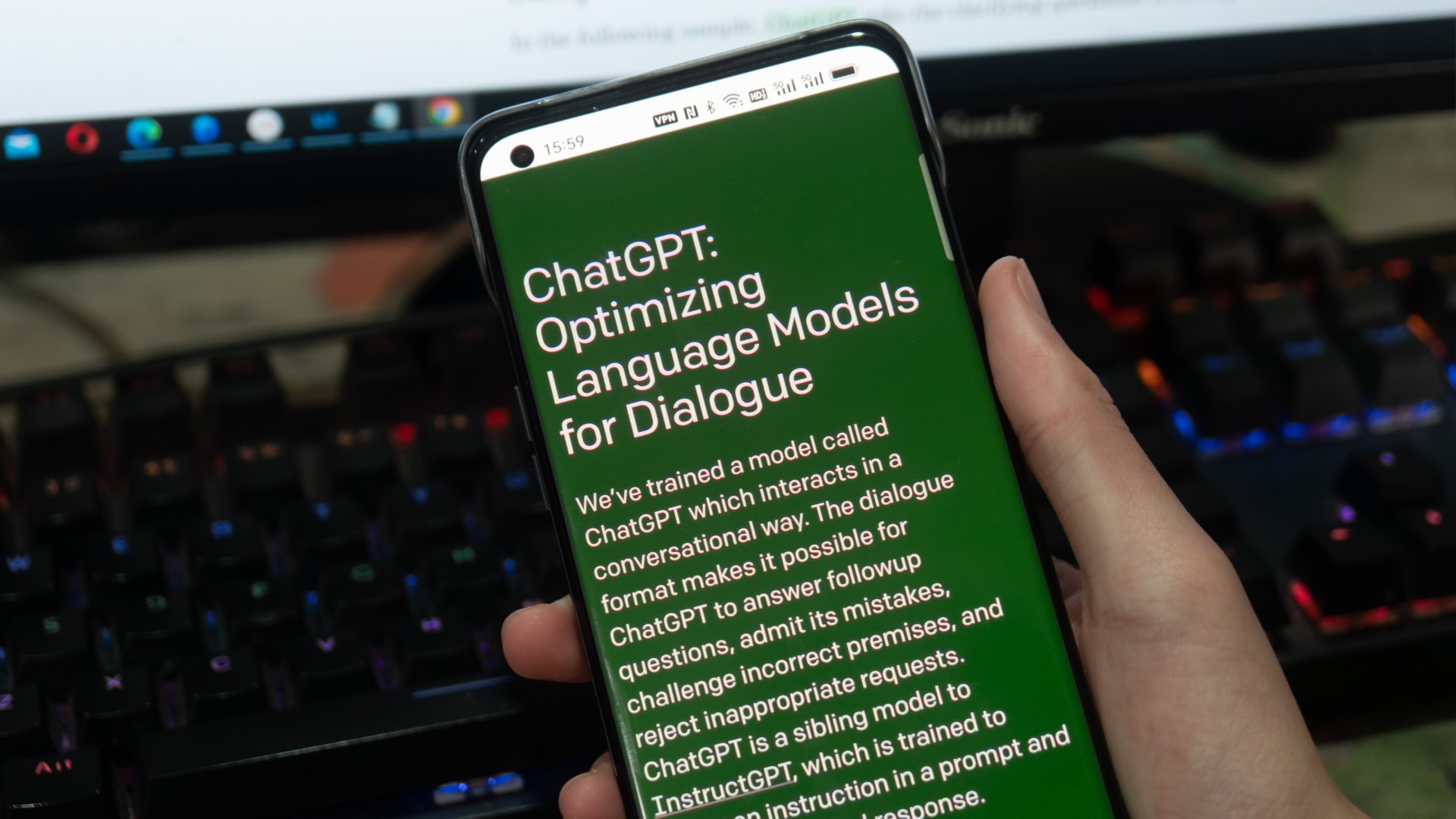
ChatGPT and similar AI tools can be incredibly helpful when writing an essay, planning a vacation or even creating images — but how well does it perform at making you greener?
I’m not talking about fits of gamma radiation-induced Hulk rage, but rather ways to live a more climate friendly lifestyle and have a better understanding of our impact on the environment.
To find out whether ChatGPT can be a useful green advisor, I’ve come up with 7 prompts that should lead to the AI generating a series of ways to help you live a greener life.
All the prompts have been tested using the premium and free version of ChatGPT. Obviously using GPT-4 will give you better results. You can use this for free with Microsoft Copilot as an alternative to ChatGPT if you aren’t already paying.
Creating the prompts for ChatGPT
Prompt Jitsu is a prompt guide series I created inspired by the tech magazines of my childhood where you could get a game demo on a floppy disk, or later a very long URL to a website with a cool demo, project or piece of code to try out for yourself.
This week I’ve decided to explore the concept of going green. After all, it was Earth Day on Monday. In previous weeks I’ve turned AI chatbots into text-game generators or created a series of prompts to help you become more efficient.
These prompts cover everything from buying environmentally friendly products to plant-based recipes if you want to try a meat-free Monday. They are each designed as a one-shot — you send the prompt and get the info, but you can also follow up for more specifics.
You can see my full conversation with ChatGPT, or start a new thread of your own with the chatbot.
1. Reducing carbon footprints
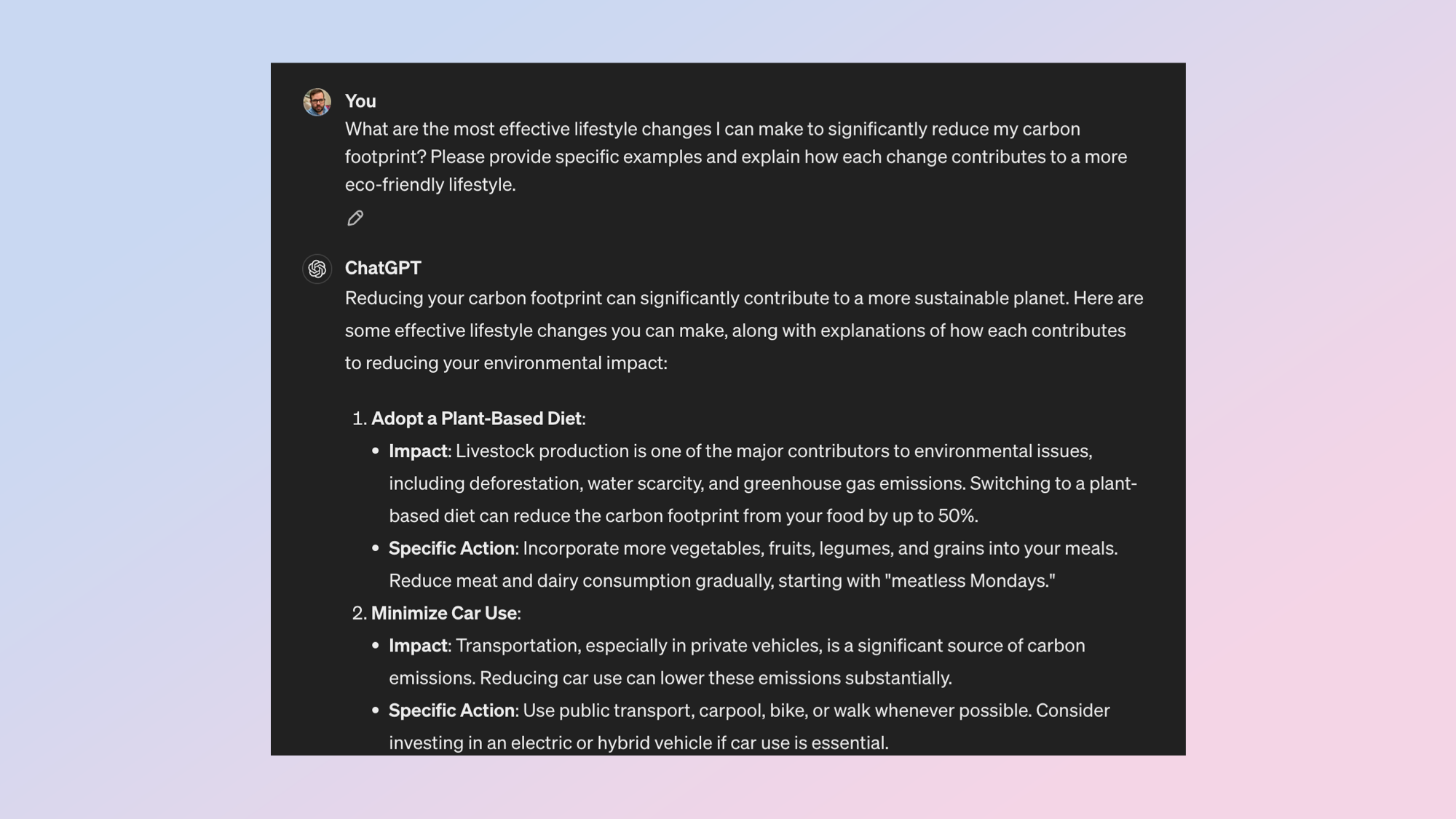
First up is the most obvious: simple ways to reduce your carbon footprint by making a series of lifestyle changes. It should break it down by category and you can ask it to explain any single item or suggestion in more detail with a follow-up prompt.
The prompt: "What are the most effective lifestyle changes I can make to significantly reduce my carbon footprint? Please provide specific examples and explain how each change contributes to a more eco-friendly lifestyle."
ChatGPT suggested I adopt a plant-based diet (more on that later), reduce car use and air travel, make my home more efficient and recycle.
All reasonable adjustments, although I’d personally go for a meat free day as a starting point and reducing car use is only really viable if what you need is in walking distance or if you have a good public transportation network.
What are the most effective lifestyle changes I can make to significantly reduce my carbon footprint? Please provide specific examples and explain how each change contributes to a more eco-friendly lifestyle.2. Alternatives to plastic
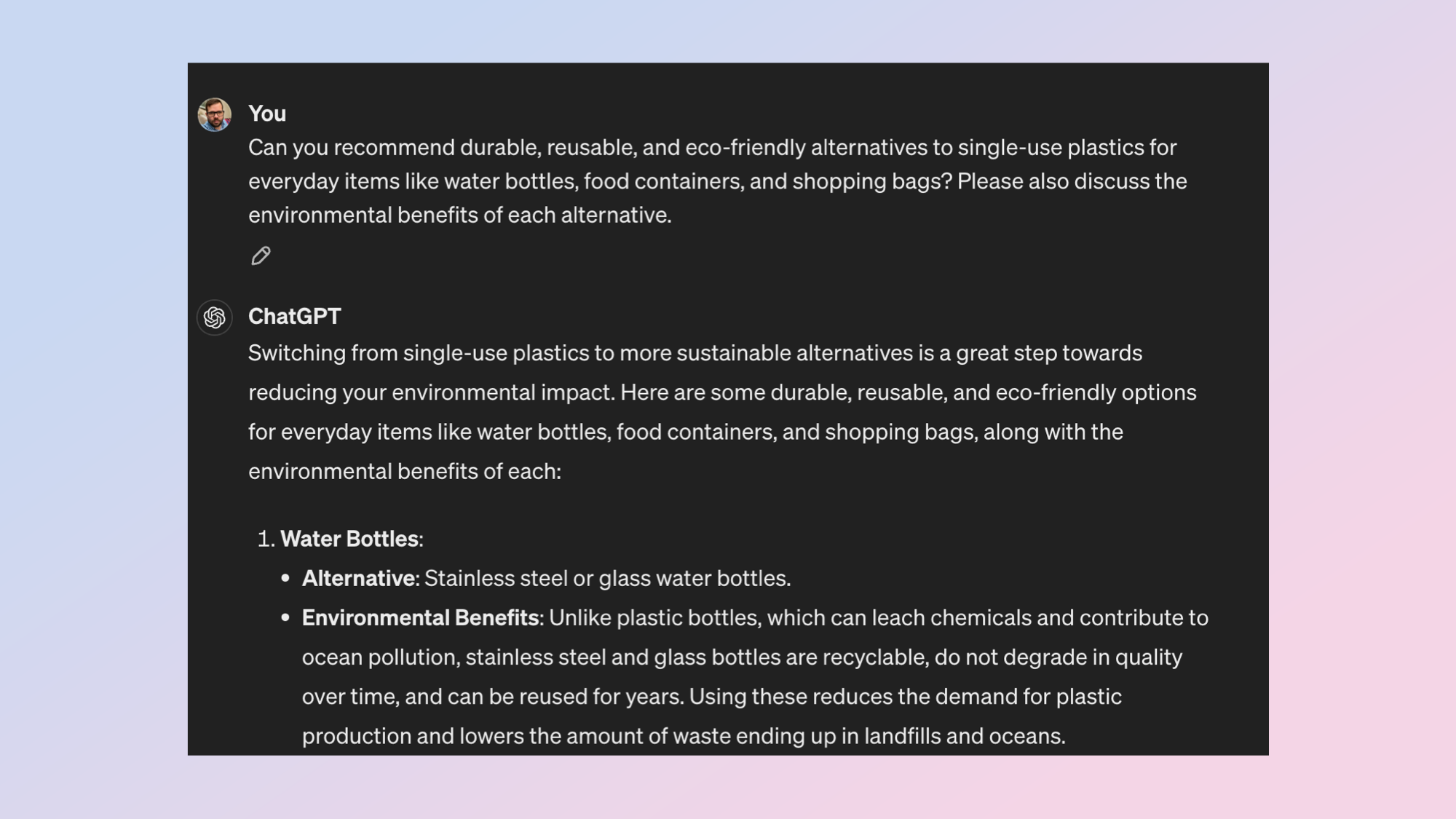
Nobody likes paper straws. They don’t work but that doesn’t mean plastic is the solution either. This prompt should offer a few alternatives for different plastic use cases.
The prompt: "Can you recommend durable, reusable, and eco-friendly alternatives to single-use plastics for everyday items like water bottles, food containers, and shopping bags? Please also discuss the environmental benefits of each alternative."
For this ChatGPT suggested switching plastic for glass water bottles and using beeswax wraps instead of food containers. Switching to bamboo straws and canvas shopping bags would also have an impact. The idea of the prompt is to offer options. You can always pick one of the suggestions and ask the chatbot to offer alternatives or explain why it helps.
Can you recommend durable, reusable, and eco-friendly alternatives to single-use plastics for everyday items like water bottles, food containers, and shopping bags? Please also discuss the environmental benefits of each alternative.3. Composting and food waste
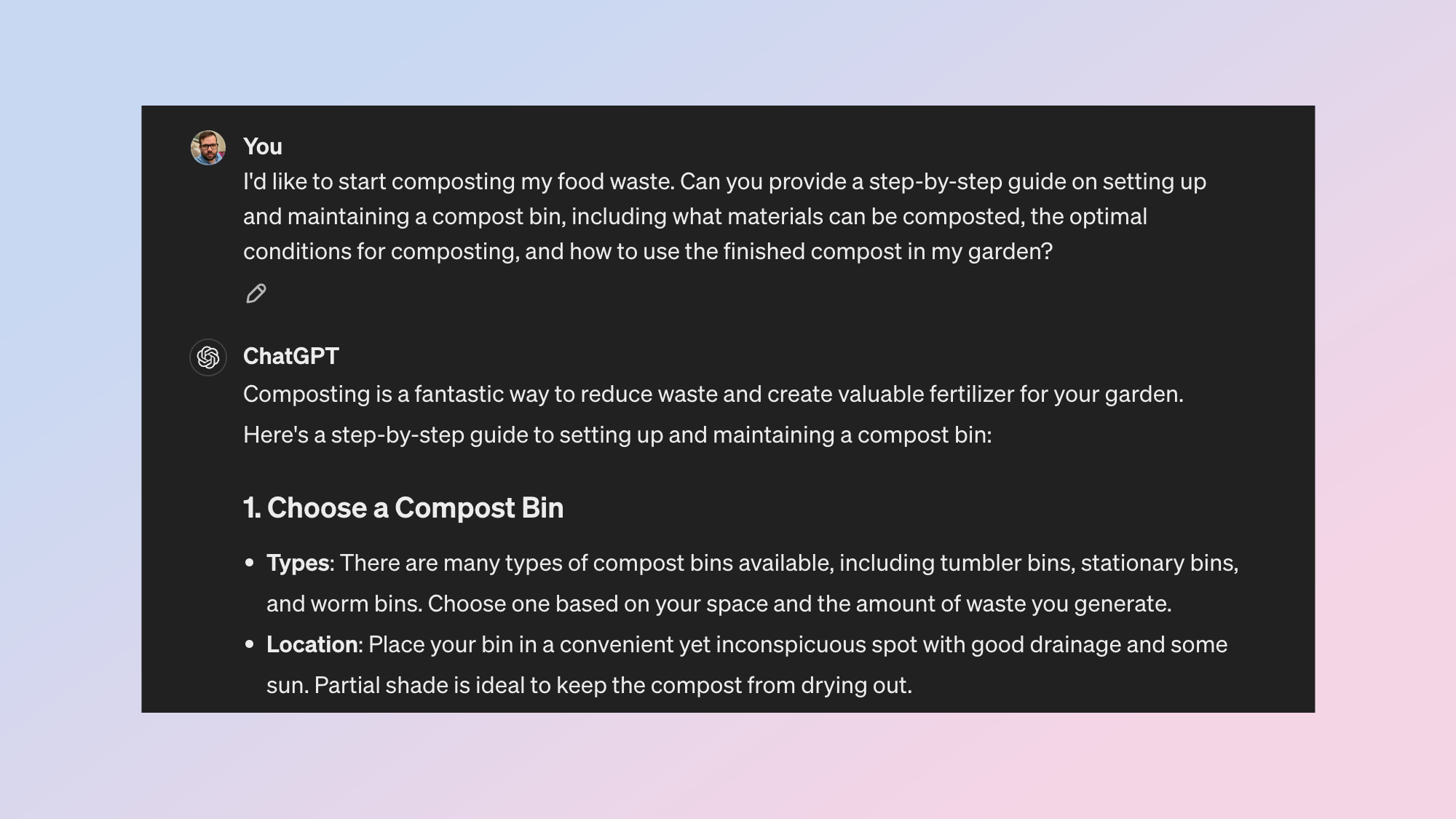
Obviously this prompt assumes space for a compost heap. If you have a smaller property you can give the AI specifics and it can offer up alternatives that might work for your circumstances.
The prompt: "I'd like to start composting my food waste. Can you provide a step-by-step guide on setting up and maintaining a compost bin, including what materials can be composted, the optimal conditions for composting, and how to use the finished compost in my garden?"
ChatGPT offered a step-by-step guide including picking a bin and where to place it, adding materials, maintaining and monitoring the condition of the bin and finally harvesting the compost after about six months.
I'd like to start composting my food waste. Can you provide a step-by-step guide on setting up and maintaining a compost bin, including what materials can be composted, the optimal conditions for composting, and how to use the finished compost in my garden?4. Energy-saving tips
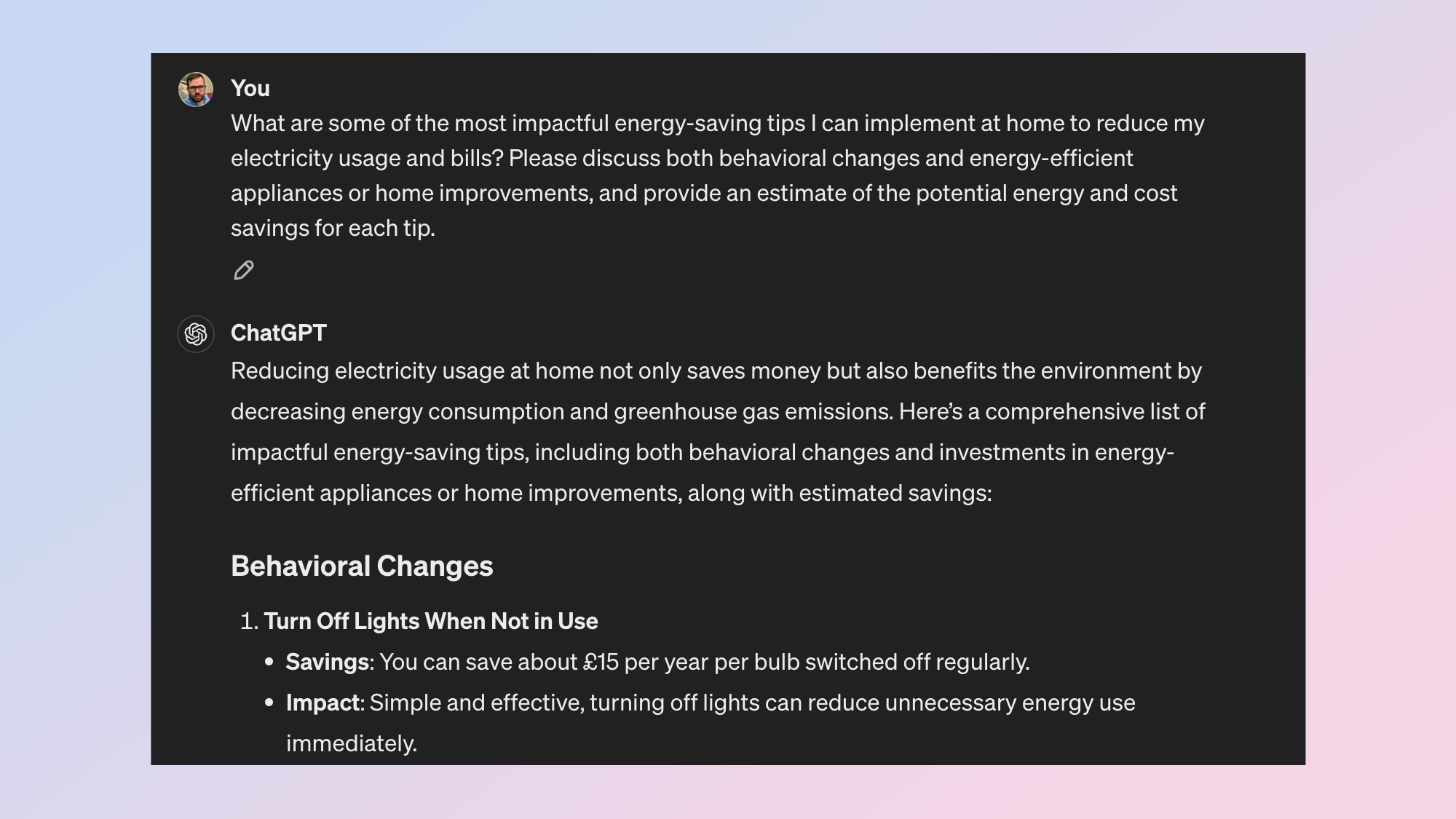
Some of the suggestions ChatGPT will offer are so obvious children can recite them, but it can also offer more detailed and specific information if you follow up the query with your own circumstances.
The prompt: "What are some of the most impactful energy-saving tips I can implement at home to reduce my electricity usage and bills? Please discuss both behavioral changes and energy-efficient appliances or home improvements, and provide an estimate of the potential energy and cost savings for each tip."
Some of the responses were exactly what you'd expect — turn off lights, unplug devices and adjust your thermostat. Others included switching to LED bulbs, improving insulation and even adding solar panels.
What are some of the most impactful energy-saving tips I can implement at home to reduce my electricity usage and bills? Please discuss both behavioral changes and energy-efficient appliances or home improvements, and provide an estimate of the potential energy and cost savings for each tip5. Climate-friendly products
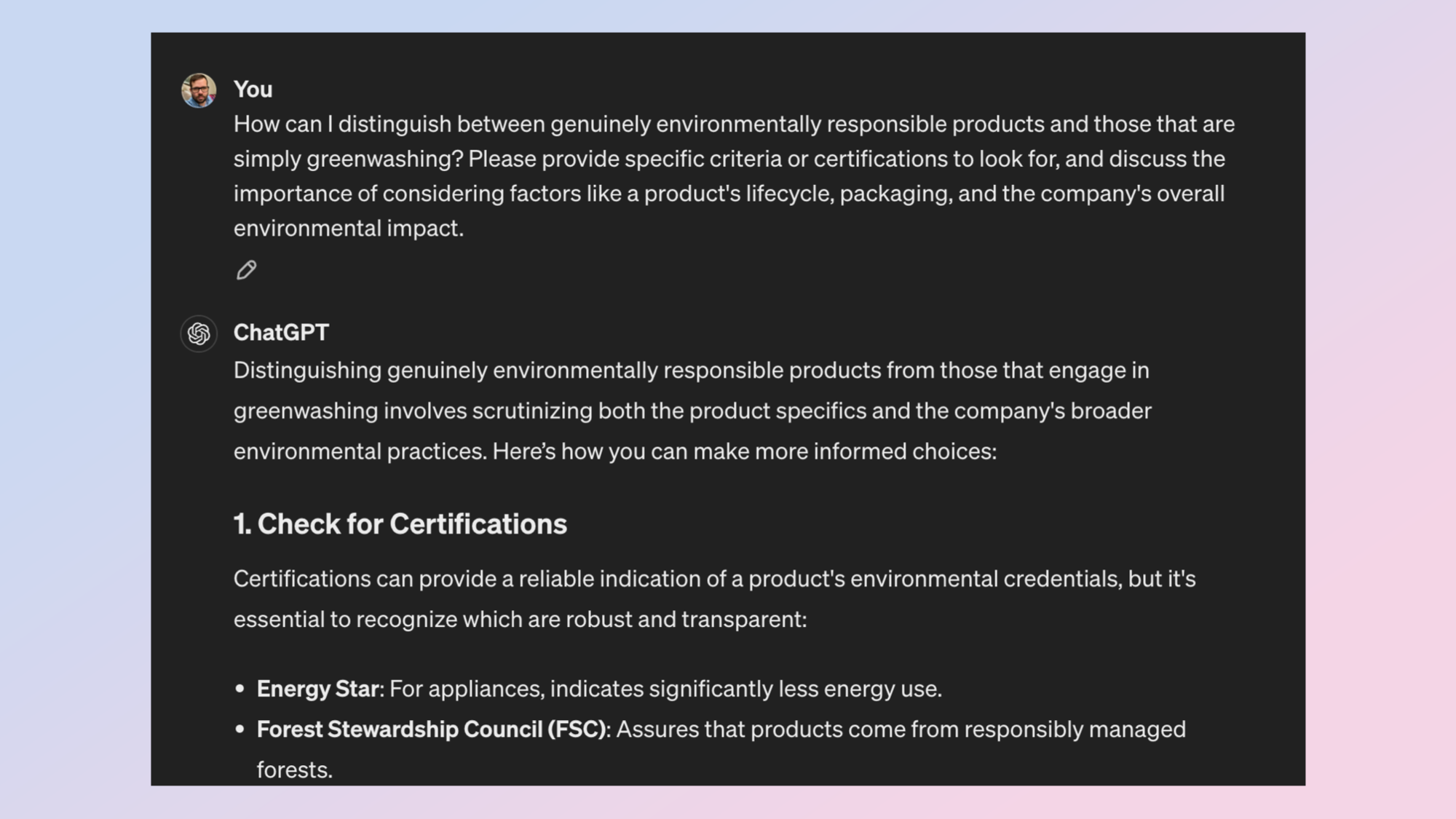
I have a couple of prompts that are similar but different around sustainable products. This prompt will give you a broad idea of what to look out for.
The prompt: "How can I distinguish between genuinely environmentally responsible products and those that are simply greenwashing? Please provide specific criteria or certifications to look for, and discuss the importance of considering factors like a product's lifecycle, packaging, and the company's overall environmental impact."
Here the AI suggested looking for certifications such as from the Forest Stewardship Council or the USDA. Other solutions include evaluating hte full life cycle of a product, the materials it is packaged in and watching for misleading greenwashing claims.
How can I distinguish between genuinely environmentally responsible products and those that are simply greenwashing? Please provide specific criteria or certifications to look for, and discuss the importance of considering factors like a product's lifecycle, packaging, and the company's overall environmental impact.6. Plant-based recipes
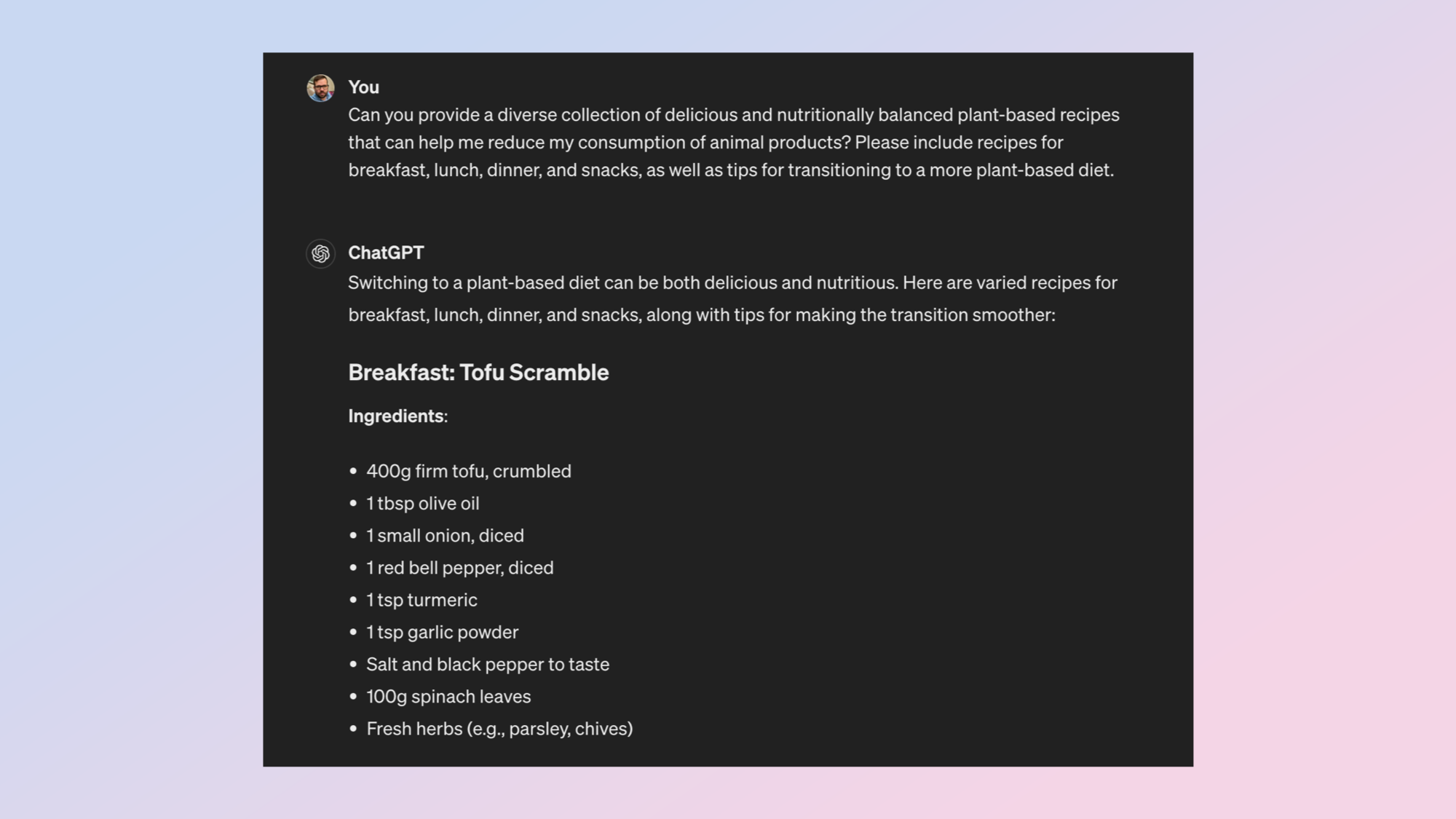
Food, glorious food. We might be a society of meat eaters but humans are omnivores and so don’t have to eat meat with every meal. This will prompt ChatGPT to share some ideas.
The prompt: "Can you provide a diverse collection of delicious and nutritionally balanced plant-based recipes that can help me reduce my consumption of animal products? Please include recipes for breakfast, lunch, dinner, and snacks, as well as tips for transitioning to a more plant-based diet."
Here ChatGPT gave me a recipe for each meal. You can follow up by asking it to remove or add ingredients, offer alternatives and generally customize the recipes. For breakfast it offered Tofu scramble, for lunch chickpea salad sandwich and for dinner a lentil and sweet potato stew.
7. Sustainable brands
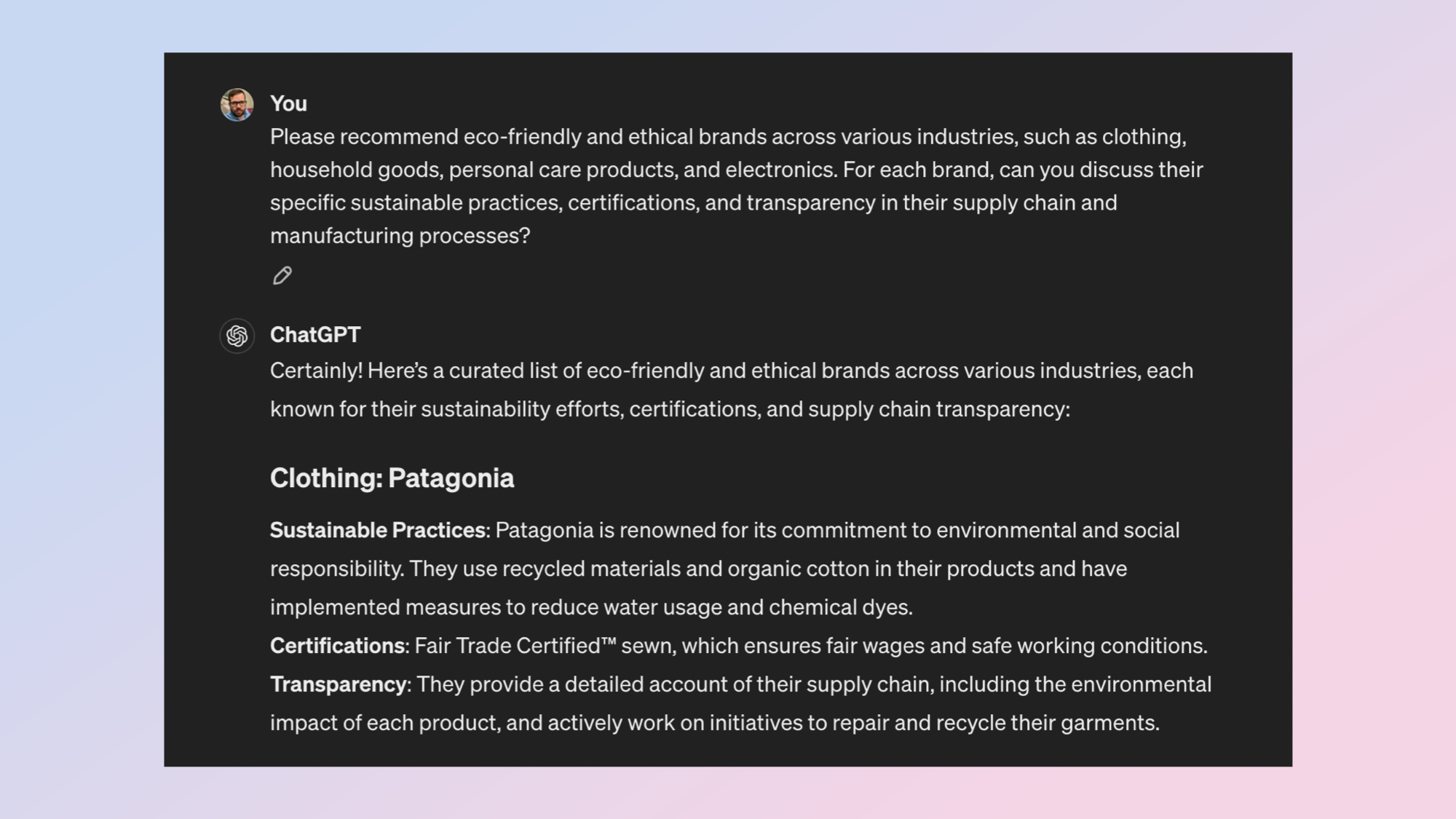
This builds on the earlier prompt but asks ChatGPT to get specific, actually listing products and brands that are more sustainable. Here you could follow up with your country or even region and ask for products in that area. You could also specify your favorite brand and asks for alternatives that are more sustainable.
The prompt: "Please recommend eco-friendly and ethical brands across various industries, such as clothing, household goods, personal care products, and electronics. For each brand, can you discuss their specific sustainable practices, certifications, and transparency in their supply chain and manufacturing processes?"
Finally, ChatGPT offered options for different areas of life including Patagonia for clothing, Ecover for household goods and Fairphone for electronics. Other suggestions included switching to Beyond Meat instead of buying actual meat.
More from Tom's Guide
If you enjoyed the prompts this week why share your output with us and then try out a series of Google Gemini prompt ideas or even make a story, song and images from previous weeks.







